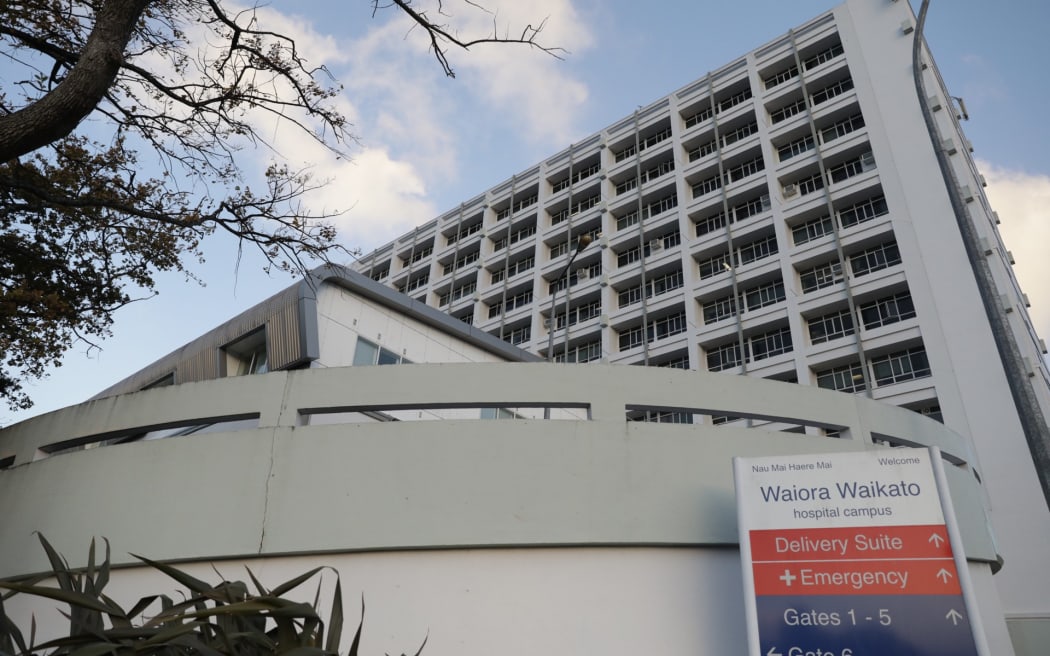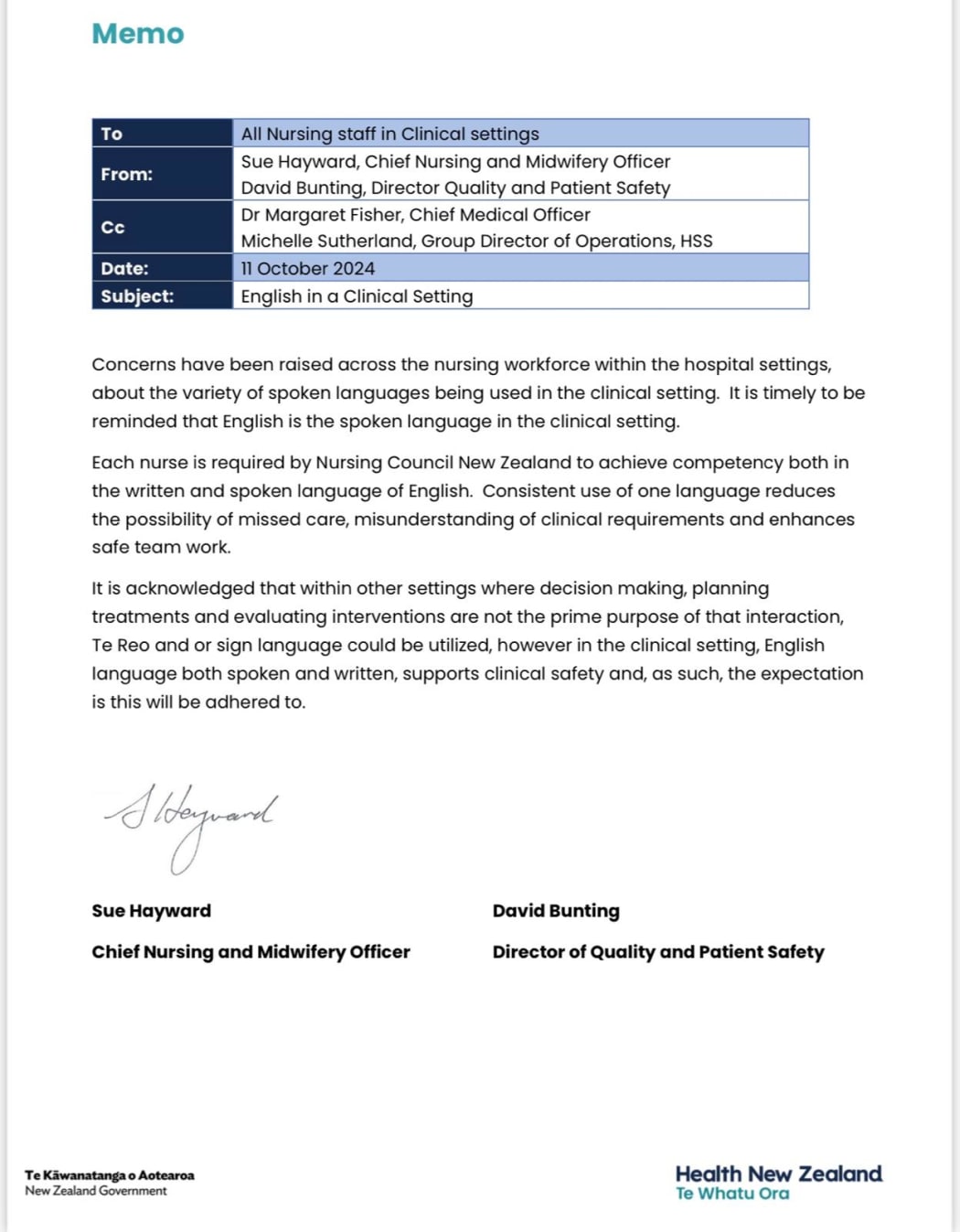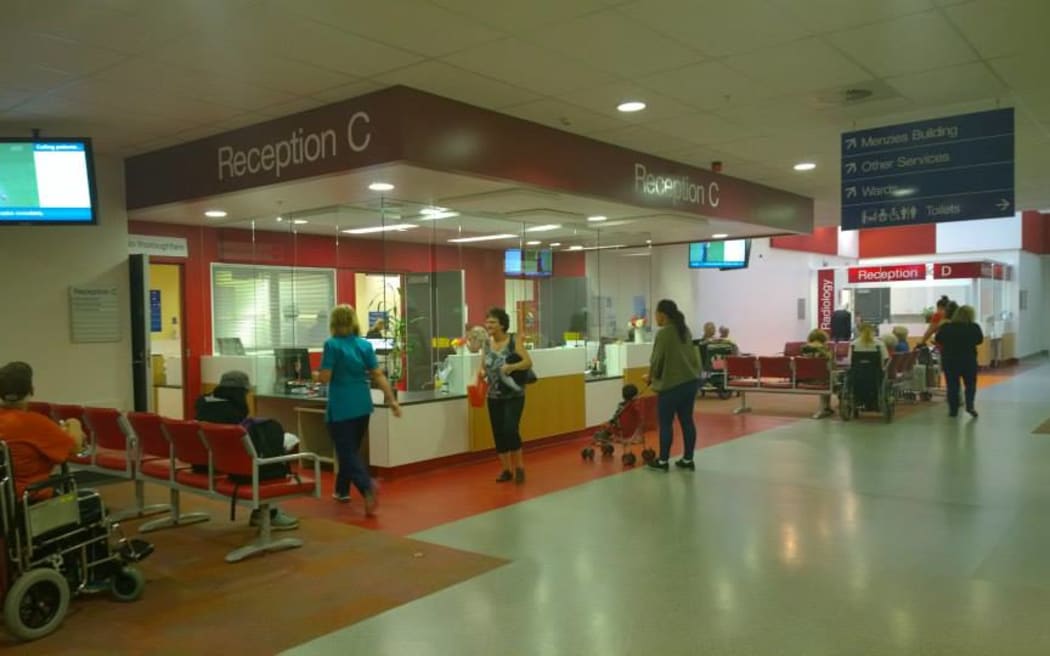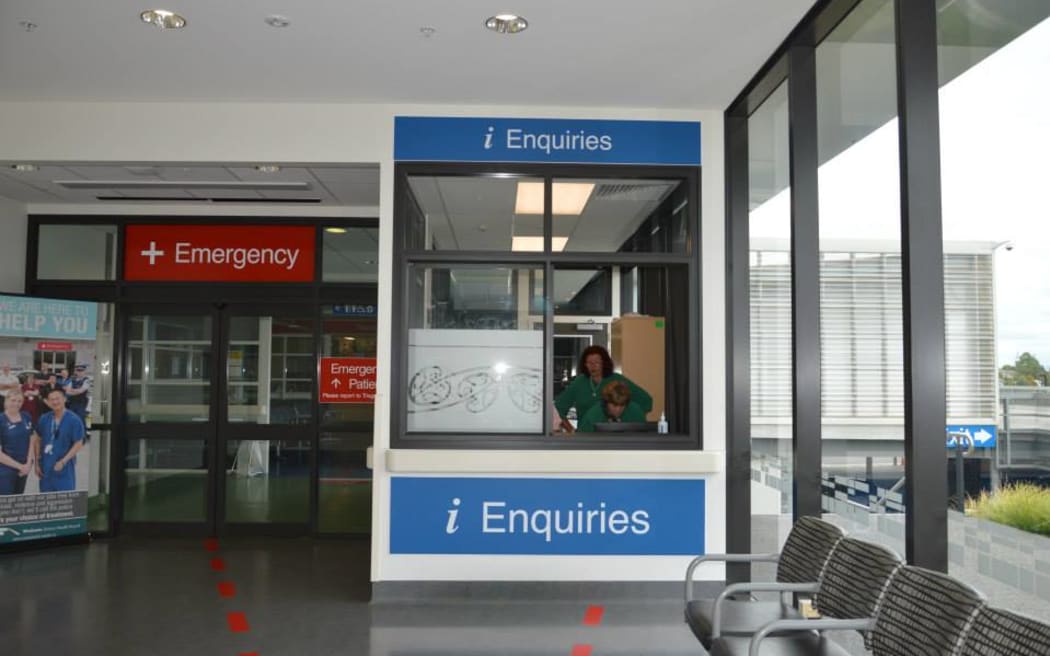
All staff are prohibited from speaking to patients in any language other than English.
Image: RNZ / Simon Rogers
Waikato State Hospital has told nurses not to speak to patients in any language other than English.
A memo sent to all nursing staff last Friday, obtained by RNZ, said concerns had been raised about the use of other languages, and that the exclusive use of English in all clinical settings was safe to treat people. .
A doctor who saw the memo said it was clearly aimed at Indian, Filipino and Pasifika nurses, who were the “heroes” of health care but were now victims.
In response to RNZ’s questions, Michelle Sutherland, director of operations for the Te Whata Ora Waikato group, said the memo had been sent to nursing staff to “help reduce confusion” because speaking English in a clinical environment was standard practice and A nursing council was needed.
She said the Nursing Council recognizes English, Te Reo Māori and New Zealand Sign Language as official languages.
The memo, which appears to be limited to the Waikato district, comes after Te Watu Ora hired thousands of extra nurses from Asia to meet a workforce shortage, draining its budget of hundreds of millions of dollars.
That too just a few days later Herald reported that a patient at a North Shore hospital requested not to be cared for by anyone of Asian ethnicity – a request that was initially met with staffing problems by management.
The Waikato Memorandum from the Head of Nursing and Midwifery, and the Director of Quality and Patient Safety also aimed to use te reo in every clinical setting.
It said: “Concerns have been raised across the nursing workforce in the hospital setting, with different languages being used in the clinical setting.”
“It is time to remember that English is the spoken language in the clinical setting.”
Every nurse should be able to speak and write English.
“Consistent use of one language reduces the likelihood of missed care, misunderstanding clinical needs and promotes safer team work.”

The memo was sent by Te Whatu Ora to Waikato staff.
Image: supplied
RNZ asked HNZ Te Whatu Ora for examples of missed care or misunderstood clinical needs.
The note continued, saying that in “other settings” – until decisions have been made, or treatment is planned or assessed – “te rio or sign language may be used”.
“However, in clinical settings, the English language, both spoken and written, supports clinical safety and, as such, the expectation is that it will be followed.”
A Waikato Hospital doctor who saw the note called it a “quite (literally: sick) email”.
“We all know between the lines that this is often directed against our most vulnerable employees in our workforce (Indian, Filipino and Pasifika nurses) who sometimes speak certain words in their own language while Works under extreme pressure to manage our high pressure wards.
“Instead of being recognized as heroes in our health care system, they have to deal with this crap from some apparently useless TWO administrators.
“Really hateful and so on [much for] Te Watu Ora embraces multiculturalism.
Hundreds, if not thousands, of international nurses have recently joined the workforce.
However, hundreds more are lured to New Zealand by foreign recruiters, without work, after spending $30,000-$50,000 to travel here, undergo competency assessments, sit exams and prove English proficiency. To obtain a license from the Board of Nursing.
India and the Philippines have officially warned nurses against coming to New Zealand without job guarantees.
Te Watu Ora Sutherland said in “many other contexts” and Health New Zealand strongly encouraged bilingualism to “support culturally responsive care”, she said.
“We have recruited a significant number of internationally qualified nurses, and we are very grateful for the contribution they make to our workforce.”
Nurses Organization Director Carrie Nocco said Morning report The union was very disappointed with what it called a “heavy-handed approach”.
The note clearly had internationally qualified nurses, she said.
“I’m not sure what the problem is here but it seems to be very directive.”
Neither the union, nor the Nursing Council, were concerned about the use of other languages, Nocco said.
“This is a manifestation of systemic racism … all these nurses are under tremendous pressure right now.”
She said the law requires nurses to be proficient in English to ensure the health and safety of the public, not other languages.
Nuku said Te Watu Ora needed to explain if they had examples of public safety being at risk.
“What would give them the right to do that?”
She said the note took a broad approach to what is considered ‘clinical’.
Nocco said that would suggest that a Filipino nurse talking to a Filipino patient could not use their common language.
“Internationally qualified nurses must demonstrate that they have clinical proficiency in the English language.”
She said the note was “far too long”.

Image: Prepared / Waikato Hospital
Recent internal reports, released by HNZ under pressure from the media last week, show that the campaign to recruit about 3,000 nurses increased how many patients received treatment, saved treatment and was good for nurses’ well-being.
“While financial results are concerning, service volume and safety are improving,” said a report in May.
But the papers also said matching nurse capacity with actual demand, using software called CCDM, is hitting the budget.
“CCDM’s unbudgeted spending, as a result of paying higher than normal budgeted hours for nursing, is the biggest risk to achieving the desired surplus,” the March financial report to the HNZ board said, before the agency revealed that it was heading towards a deficit. Over a billion dollars, and the government sacked the board.
The government’s claims of HNZ’s financial illiteracy were confirmed last week by commissioners who replaced the board, telling the media that while there were accounting issues, and “fundamental flaws” in the systems as well There was a lack of internal control. Not a case of mismanagement.
The government is promising to find $2 billion in savings – up from $1.4 billion last week – without affecting the front line.
However, Health NZ is already proposing to cut chief medical officer jobs by 22 per cent across the country, from 18 to 14, as RNZ revealed last week.
The nurses’ organization said staffing levels remained precarious and that there was a recruitment freeze, something Health NZ denied.
In July 2023, Te Whatu Ora estimated that it was 4800 nurses short. By March 2024, the number of nurses has increased to 2886.

Reception desk at Waikato Hospital.
Image: Prepared / Waikato Hospital
Nurses International representatives say the council and recruitment agents are still saying there are jobs, despite nurses being turned down for jobs because they got the job, they only had a visit visa.
“Actually, there are a lot of discharges happening in hospitals at the moment,” said Monina Hernandez, president of the Filipino Nurses Association of New Zealand. From nine o’clock to noon last week.
“So there is this … gap between what is being said by the government and what is actually happening among the nursing workforce.”
Sign up for Nga Pitopito Koreroa daily newsletter created by our editors and sent directly to your inbox every week.
#Waikato #Hospital #told #staff #speak #English